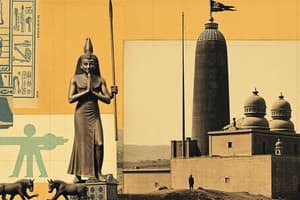Podcast
Questions and Answers
What is the purpose of fasting during the Islamic holy month of Ramadan?
What is the purpose of fasting during the Islamic holy month of Ramadan?
What is the significance of the pilgrimage to Mecca?
What is the significance of the pilgrimage to Mecca?
What event marked a turning point for Muhammad?
What event marked a turning point for Muhammad?
What is the holy book of Islam?
What is the holy book of Islam?
Signup and view all the answers
What was the result of Muhammad's march to Mecca?
What was the result of Muhammad's march to Mecca?
Signup and view all the answers
What did Abu-Bakr use to protect and preserve Islam after Muhammad's death?
What did Abu-Bakr use to protect and preserve Islam after Muhammad's death?
Signup and view all the answers
What is the term for the successors of Muhammad?
What is the term for the successors of Muhammad?
Signup and view all the answers
What was the result of Muhammad's unification of the Arabian Peninsula under Islam?
What was the result of Muhammad's unification of the Arabian Peninsula under Islam?
Signup and view all the answers
What is the geographical location of Southwest Asia?
What is the geographical location of Southwest Asia?
Signup and view all the answers
What is the primary occupation of the Nomadic Arab herders in the desert?
What is the primary occupation of the Nomadic Arab herders in the desert?
Signup and view all the answers
What was the role of clans in the Bedouin society?
What was the role of clans in the Bedouin society?
Signup and view all the answers
What was the occupation of Muhammad before he received the revelations?
What was the occupation of Muhammad before he received the revelations?
Signup and view all the answers
What was the significance of Muhammad's experience in the cave in Mecca?
What was the significance of Muhammad's experience in the cave in Mecca?
Signup and view all the answers
What is the meaning of the term 'Muslim'?
What is the meaning of the term 'Muslim'?
Signup and view all the answers
What is the first duty of the Five Pillars of Islam?
What is the first duty of the Five Pillars of Islam?
Signup and view all the answers
How often do Muslims pray in a day?
How often do Muslims pray in a day?
Signup and view all the answers
Study Notes
Southwest Asia: The Middle East
- Southwest Asia is a bridge between Africa, Asia, and Europe, located on the Arabian Peninsula
- The region is significant for trade and the sharing of goods
- A small part of the Arabian Peninsula is fertile, supporting agriculture, while the majority is dessert, where Nomadic Arab herders live
Bedouins and Arab Nomads
- Bedouins are Arab nomads organized into tribes or clans
- Clans provided safety and security in extreme conditions
- Clan ideals, such as courage and loyalty, became part of the Islamic way of life
Early Life of Muhammad
- Muhammad was born in Mecca
- He was born into a clan and raised by his grandfather and uncle
- Muhammad received no formal education and worked as a trader/business manager
- He married Khadija, a businesswoman, and worked under her
Revelations and Islamic Beliefs
- Muhammad received revelations from Allah through the Angel Gabriel
- He believed he was the last prophet and taught that Allah is the one god
- Muslims are "those who have submitted" to the will of Allah
- Islam means "submission of will of Allah"
Early Spread of Islam
- Muhammad's first followers were Khadija and friends
- He preached in Mecca, but faced backlash for his revolutionary ideas
The Five Pillars of Islam
- To be a Muslim, one must carry out five duties:
- Faith: testifying to "There is no God but Allah, and Muhammad is the Messenger of Allah"
- Prayer: five times a day, facing Mecca
- Alms: giving money to support the less fortunate
- Fasting: during the Islamic holy month of Ramadan
- Pilgrimage: performing the hajj to Mecca at least once
Hegira and Medina
- In 622 CE, Muhammad left Mecca and moved to Yathrib (renamed Medina)
- This marked a turning point for Muhammad, where he attracted devoted followers
- Muhammad demonstrated leadership in medicine and made an agreement uniting Jews and Arabs as one community
Returning to Mecca
- In 630 CE, Muhammad and his followers marched to Mecca
- Mecca's leaders surrendered, and Muhammad destroyed idols in the Kaaba
- He called for prayer from the roof of his house, and the Meccans pledged loyalty to him, converting to Islam and joining the umma
The Quran and Caliphs
- The Quran is the holy book of Islam
- Muhammad did not force conversion, allowing people to practice different faiths
- After Muhammad's death, the Muslim world was divided, and Abu-Bakr was elected as the first leader, or caliph
- The first four caliphs, known as the "Rightly Guided" Caliphs, used the Quran and Muhammad's actions as guidance for leadership
- Abu-Bakr used jihad to protect and preserve Islam
The Caliphate
- The caliphate was a system of rule, with the caliph as the successor to Muhammad
- Abu-Bakr and the subsequent caliphs used jihad to encourage and justify their actions
Studying That Suits You
Use AI to generate personalized quizzes and flashcards to suit your learning preferences.
Description
This quiz explores the geography and culture of Southwest Asia, including the Arabian Peninsula, and the lifestyle of the Bedouin nomads who lived in the desert regions. It also touches on the fertile areas and oases that supported agriculture and early settlements.




